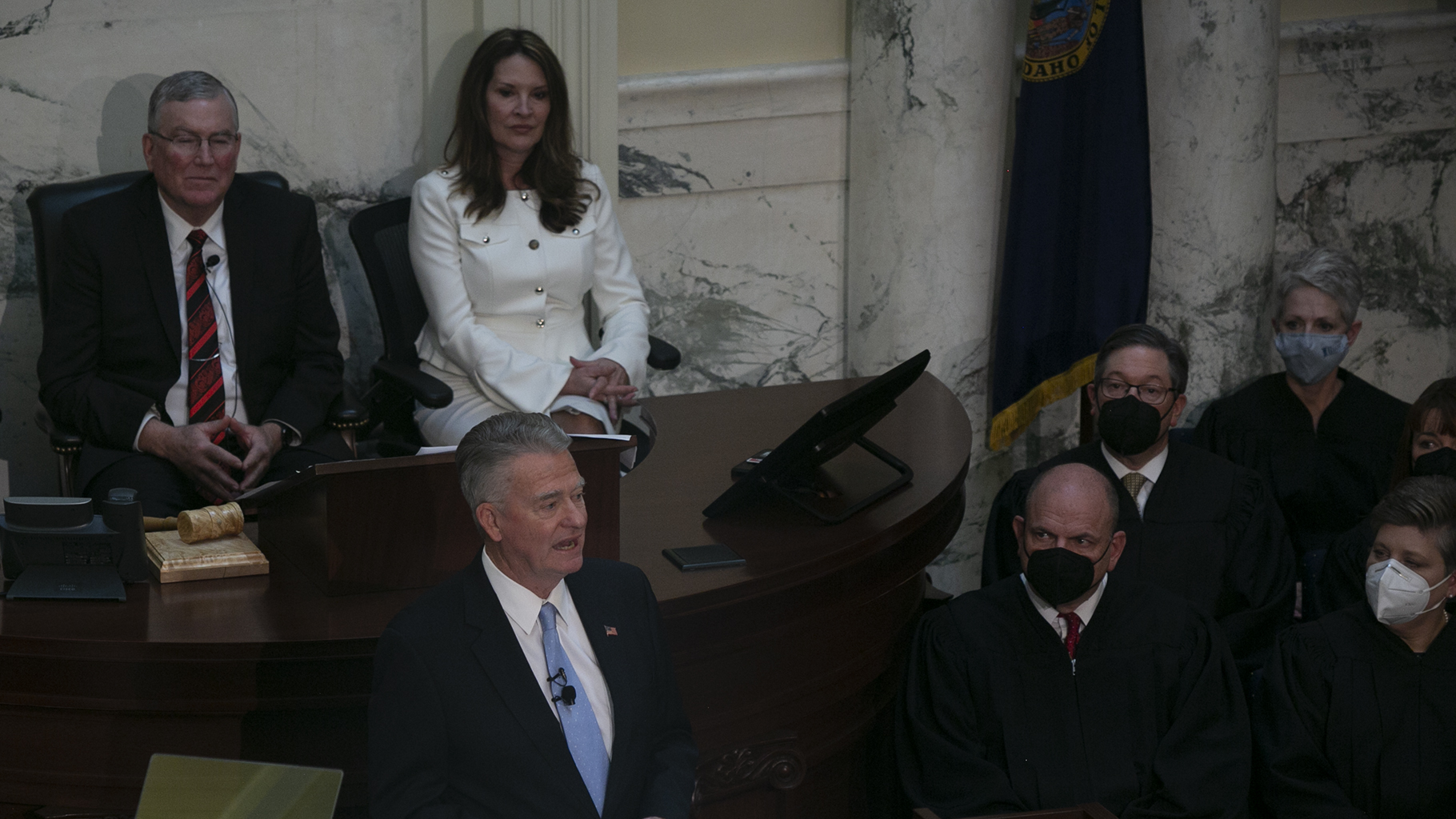
How do you say you’re running for re-election without saying you’re running for re-election?
Gov. Brad Little tried to tiptoe that line Monday.
The Republican’s fourth State of the State address included plenty of conservative fan favorites: pledges to cut taxes again, and take another whack at government red tape. He worked in plenty of digs at a Democratic White House — trying out talking points that will fit into stump speeches for the long slog of Lincoln Day luncheons and banquets that await any statewide GOP candidate.
In the 30-minute speech, Little also sketched out his plans for the 2022 session — and for a record-shattering (and seemingly ever-growing) $1.9 billion budget surplus. Several of the big-ticket items involve education: a $104 million plan to boost teacher salaries, another $105 million to help cover K-12 employee benefit costs, and a $47 million literacy proposal that could cover all-day kindergarten across much of the state.
The speech summed up the opportunity — and the challenge — facing Little in this election year. He has before him a no-excuses legislative session. If he can’t deliver on the promises he made Monday, it won’t be for a lack of money. But if Little doesn’t deliver another round of tax cuts before the GOP primary, and if his opponents can successfully label him a big spender, his fourth State of the State address could be his last.
For all intents and purposes, Little is on the campaign trail, vying for the chance to deliver a fifth State of the State a year from now. Little has reported more than $1.1 million for a barely unannounced re-election bid. During a question-and-answer session with reporters Friday, Little tried to be coy about running. “I wouldn’t bet against it,” Little told reporters at a legislative preview Friday. “Unless you get really good odds.”
Little spent part of Monday’s speech clicking off highlights from his resume — in comments aimed as much toward prospective primary voters as they were geared to the 105 legislators gathered in House chambers.
He tried to burnish his credentials as a budget hawk, touting the $1 billion in tax cuts already passed on his watch. He tried to address conservative pushback over his response to the coronavirus pandemic, reminding his audience that he never mandated masks, vaccines or allowed so-called vaccine passports. “We responded to a crisis with a balanced approach and kept Idaho open.”
He never directly addressed his political adversaries — especially Lt. Gov. Janice McGeachin, who sat behind Little, over his left shoulder, for the duration of the speech. But his remarks about leadership were a thinly veiled reference to the Little-McGeachin political struggles during the duration of the pandemic. “The voice of a leader is effective, not just loud.”
When it came to Biden, Little left no room for interpretation. He blasted Biden’s vaccine mandates and border policies, and twice used the term “Bidenflation” to describe the state of the economy.
“I guess he had to throw some red meat out there,” House Minority Leader Ilana Rubel, D-Boise, said after Monday’s speech. “Just throwing wild insults at the chief executive of the country isn’t going to get us a lot of goodwill.”
Setting aside the broadsides, here’s a nuanced little reality. The record-setting surplus is supplemented, to an undetermined but probably significant extent, by the one-time federal stimulus money that has been pumped into the state’s budget and the state’s economy.
And Little is counting on that federal money. He wants to put some of it toward teacher salaries, to accelerate the pay raises and help schools compete for employees in a tough labor market. He wants to use $50 million of federal money for an Empowering Parents Grants programs, designed to help parents pay for computers, internet access or tutoring for their kids.
All State of the State addresses set the tone for the legislative session, and the debates to come:
Tax relief. Little will probably find a good deal of support for another round of income tax relief — $350 million in one-time rebates, and tax cuts that would total $250 million next year. During a news conference Monday morning, a group of 31 conservative lawmakers said income tax cuts were on their list of priorities. But from both ends of the spectrum, conservative Rep. Ron Nate, R-Rexburg, and Rubel talked up bills to eliminate the sales tax on groceries, an idea Little also supports.
All-day kindergarten. Rubel complimented Little’s $47 million literacy proposal, but said she’d have preferred to see Little make a clear push for consistent, statewide all-day kindergarten. “That could be a real legacy item.”
House Speaker Scott Bedke, R-Oakley, said he liked the idea of giving school districts the options to establish all-day kindergarten, or try other ideas to help their at-risk readers. “It sounded good,” he said. “It built on these literacy programs of past years.”
Higher education. While lawmakers cut $2.5 million from university budgets last year — in an attempt to send a message about social justice programs — Bedke said his House GOP caucus understands the value of higher ed. As for the proposal to boost higher ed spending by $22.3 million, Bedke said, “That’s something that the committees will pick apart. They’ll have to make their case.”
Rubel, meanwhile, said she would take the money and run. “There is a war on higher education going on right now. … I would be very grateful to get that (budget increase) in this political climate.”
This year, everything in the Statehouse will unfold in a superheated political climate. So it was with Little’s speech. He set high expectations for what he wants to do with a historic surplus, while seeking to appease the conservative base that often decides Republican primaries. A difficult speech to start a challenging session.
Each week, Kevin Richert writes an analysis on education policy and education politics. Look for his stories each Thursday.
